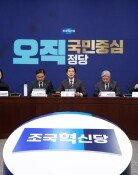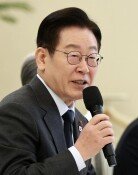S. Korea further strengthens its economic security alliance with U.S.
S. Korea further strengthens its economic security alliance with U.S.
Posted July. 20, 2022 07:56,
Updated July. 20, 2022 07:56
In a meeting with U.S. Secretary of Treasure Janet Yellen on Tuesday, South Korean President Yoon Suk-yeol said that he “expects the scope of the ROK-US security alliance to be firmly expanded beyond the political and military area to the field of economy and finance. At LG Science Park she visited earlier, Secretary Yellen highlighted the importance of cooperation for economic security between the two nations, saying, “We must keep countries that make arbitrary decisions like China from becoming a threat to the security of our nations taking advantage of unfair practices.” She also met with Deputy Prime Minister and Finance Minister Choo Kyung-ho, and Bank of Korea Governor Rhee Chang-yong to explore various ways for bilateral cooperation.
The efforts to strengthen the ROK-US alliance in economic security are being made in an ever more concrete and in-depth way, evolving beyond the comprehensive strategic alliance declared by the two leaders two months ago and the participation in the Indo-Pacific Economic Framework (IPEF). The two sides have been discussing diverse ways for economic security cooperation through a variety of channels and now reached a point to set the level and scope of cooperation in detail.
Korea’s participation in the “Chip 4” alliance, regarding which the U.S. is putting pressure on the Korean government to join by the end of August, seems to be on track. As the U.S. remains firmly committed to gaining the upper hand for cutting-edge technologies in its competition for technological hegemony with China, it has become difficult for Korea to decline the U.S.’ offer giving the reason that China will be up in arms. Korea may have thought that it may work as an opportunity for the country to raise its international profile in the global semiconductor market when the global supply chain is put under great strain by Russia’s invasion of Ukraine.
Putting its domestic semiconductor sector first, the U.S. is currently working on a bill to foster the industry by establishing guardrails to block global semiconductor companies supported by the U.S. from working with China in leading-edge semiconductors. The bill would put a great deal of pressure on Korea, which is thinking over joining the “Chip 4” alliance. Some say that if the country decides not to, the alliance will go by “Chip 3” and the Netherlands will pitch in later instead of Korea.
As expected, Korea is facing a backlash from China. China’s public news agency argued that it is clear Korea’s surrender to the U.S. will do more harm than good.” It may be interpreted as a threat from China that Korean companies can be targeted for revenge as almost half of Korea’s memory chip exports go to China. But the government cannot hesitate on the issue that could put the national interest at stake.
Economic security alliance has become an irreversible reality with no options left. However, Korea cannot ignore the fact that 90 percent of raw materials, the backbone of Korea’s leading five manufacturing sectors, are from China. It is desperate for active diplomacy that focuses on the national interest. Seizing the opportunity for strategic communications and discussions with China, the South Korean government should explain the country’s current position to its neighbor and refrain from sparking any unnecessary disputes or conflicts.







